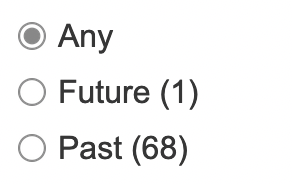built-in facet type
Custom facet types

You can create your own facet types with FacetWP.
To demonstrate this, we created an example plugin that lets users filter by future or past date. You can see/clone the code in this GitHub repo:
https://github.com/FacetWP/facet-future-past
Anatomy of a facet type
Each facet type consists of 2 main parts:
- The facet class
- The facet registration (using the facetwp_facet_types hook)
The facet class
Each facet type inherits from the FacetWP_Facet class and contains most (if not all) of these methods:
| Method | Purpose |
|---|---|
| __construct() | Set the facet type’s label and (optional) settings fields |
| load_values( $params ) | (optional) Pulls facet choices from the database. Not all facet types (e.g. number range) use this method. The returned data is passed into render() via $params['values'] |
| render( $params ) | Generates the HTML output |
| filter_posts( $params ) | Returns an array of post IDs that match the selected values for this facet |
| admin_scripts() | Outputs custom scripts or CSS for the admin settings page |
| front_scripts() | Outputs custom scripts or CSS for front-facing facet pages |
|
register_fields()
|
(optional) Add custom settings fields |
The above (GitHub) example uses all of the above methods, except for admin_scripts.
Registering the facet type
Here’s how we’re registering the future_past facet type:
How to use custom PHP code?
PHP code can be added to your (child) theme's functions.php file. Alternatively, you can use the Custom Hooks add-on, or a code snippets plugin. More info
add_filter( 'facetwp_facet_types', function( $types ) { include( dirname( __FILE__ ) . '/facet-future-past/class-facet.php' ); $types['future_past'] = new FacetWP_Facet_Future_Past(); return $types; });
